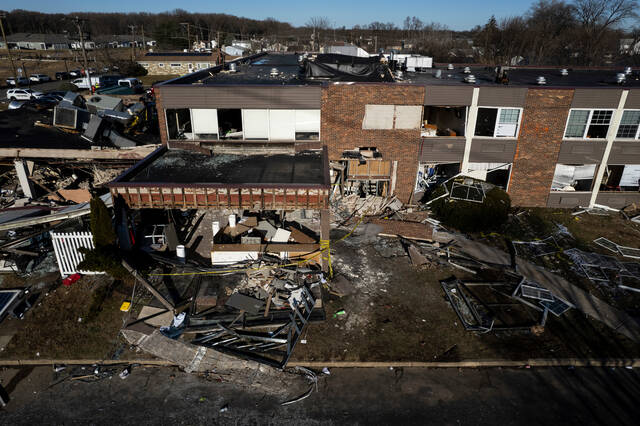Pittsburgh resident Otis Keasley has not missed voting in an election in more than five decades.
The 2024 primary was no different — except that Keasley, a Vietnam War veteran, decided to mail in his ballot for the first time. His sister-in-law was ill and needed him to help care for her at home.
The process proved easy, Keasley, 73, of the North Side said Tuesday. He believed he had filled everything out correctly and sent it off to the Allegheny County elections division.
It wasn’t until after the April 30 primary that Keasley learned his ballot had been thrown out over an incorrect date.
“The ballots are in on time. What does the date matter?” Keasley said. “I was mad as hell.”
On Tuesday, Keasley’s experience became part of a lawsuit filed by several voters’ rights organizations against the Pennsylvania Secretary of State and elections boards in Allegheny and Philadelphia counties. It challenges the constitutionality of the mandatory handwritten date on the outside secrecy envelope of mail-in ballots.
Although there have been several previous lawsuits challenging the date requirement in other courts, Tuesday’s lawsuit, filed in Pennsylvania’s Commonwealth Court, focuses primarily on state constitutional claims.
Marian K. Schneider, an attorney with the American Civil Liberties Union of Pennsylvania, which represents the plaintiffs, said that the challenge filed in state court could settle the dispute once and for all.
Whatever the decision in Commonwealth Court, it will likely be appealed to the Pennsylvania Supreme Court for a final ruling.
“The goal of this lawsuit is to get clarity and uniformity in the law,” Schneider said. “The consequence of not complying with a rule that is meaningless is very harsh. That’s what we’re trying to remedy.”
The lawsuit said that voting by mail has been a “boon” for voter participation in Pennsylvania, leading to 2.7 million absentee or mail-in ballots submitted in the 2020 general election. In this year’s primary, more than 714,000 Pennsylvanians voted by mail.
The lawsuit alleges that failure to count mail-in ballots with undated or misdated return envelopes resulted in 10,000 disenfranchised voters in the 2022 election and thousands more – the exact number is unknown – in the 2024 primary.
Several of the organizations who filed Tuesday’s suit, including Common Cause, POWER Interfaith and Black Political Empowerment Project, are also involved in another still-pending federal court case.
In that case, the groups filed a lawsuit in November 2022 against all 67 county boards of elections in Pennsylvania challenging the handwritten date provision and alleging that not counting mail ballots with a trivial error on the return envelope violated a provision of the federal Civil Rights Act of 1964, which prohibits disenfranchising voters who make immaterial errors on paperwork required to vote.
U.S. District Judge Susan Paradise Baxter agreed, ruling in November that ballots with incorrect or missing dates ought to be counted.
However, her decision was overturned in March by a panel of the 3rd U.S. Circuit Court of Appeals.
“The Pennsylvania General Assembly has decided that mail-in voters must date the declaration on the return envelope of their ballot to make their vote effective,” wrote Judge Thomas Ambro. “The Supreme Court of Pennsylvania unanimously held this ballot-casting rule is mandatory; thus, failure to comply renders a ballot invalid under Pennsylvania law.”
The full Third Circuit refused a request to rehear the case. Instead, the appellate court remanded it to Baxter to address an issue concerning military and overseas civilian mail-in ballots. If those ballots are missing a date on the outer envelope, they are still counted, which means those voters are treated differently from everyone else. Baxter has not yet ruled.
The plaintiffs hope that Commonwealth Court will rule that enforcing the date requirement violates the state constitution.
That, Schneider said, would remedy the inconsistent application of the rule across counties.
According to Pennsylvania’s Election Code, a voter “shall…fill out, date and sign the declaration” printed on the outer envelope.
“However, the date written on the envelope is not used to establish whether the mail ballot was submitted on time. Indeed, lawsuits in both state and federal court have conclusively demonstrated that the date is meaningless, necessary neither to establish voter eligibility nor timely ballot receipt,” the lawsuit said.
Ellen Lyon, a Pennsylvania state department spokeswoman, said that the government agrees with lawsuit’s claims that the handwritten date serves no function, and their attorneys have argued that in court consistently for years.
“However, given existing court rulings and pending any further legal developments, our guidance on undated and incorrectly dated ballots remains unchanged: All voters must sign and date their declaration envelope in order to have their vote counted,” she said.
Abigail Gardner, a spokeswoman for Allegheny County, said that all counties are required to follow the department’s guidance in not counting undated, or wrongly dated ballots.
“Allegheny County is committed to ensuring voters have the information they need to properly complete their ballots and has consistently had a robust cure process so that voters can correct inadvertent errors such as having an incomplete date or signature on the ballot return envelope,” she said.
In the 2024 primary, Allegheny County received 96,271 mail-in ballots.
Of those, 1,433 were returned to voters because of an error, including a bad date or missing signature, Gardner said.
More than 61% of those, of 884, were cured and resubmitted.
“We worked very hard to get as many cured as possible,” Gardner said. “Allegheny County’s administration takes the rights of voters seriously and continues its efforts to assure that votes cast by its registered voters will be counted.”
One of the plaintiffs in Tuesday’s suit, Common Cause Pennsylvania, began seeing this issue pop up in counties across the state, said spokesman Philip Hensley-Robin,
“We work really hard throughout the election season to make sure every eligible vote counts,” he said. “It is so outrageous that thousands of ballots are rejected for this reason.”
The complaint alleges that voters impacted by the date provision are disproportionately senior citizens who have voted dutifully for decades.
Keasley said he has voted in every election since his return from Vietnam. His first vote, he said, was against President Richard Nixon.
Normally, Keasley would take his and his wife’s ballots to the elections office personally.
He made sure to “triple check” all of the information and instructions before mailing in his ballot. After learning the date was incorrect, though, he said he did not receive instruction on how to cure it.
In addition to Keasley, another Pittsburgh-area resident, Joanne Sowell, 76 of Wilkinsburg also had her ballot tossed because of an incorrect date on the outside envelope.
Sowell had been voting through mail-in ballots since 2020. This year was no different. She received her mail-in ballot, marked it, placed it into the security envelope and signed it, crossing voting off her list of things to do before heading on vacation.
But on April 14, while boarding a flight to New York to embark on a cruise the next day, Sowell read an email alerting her to a mistake on the date.
She wouldn’t return from her trip until three days after the election.
“I was mad at myself,” Sowell said. But there was nothing she could do.
“I said forget it.”








